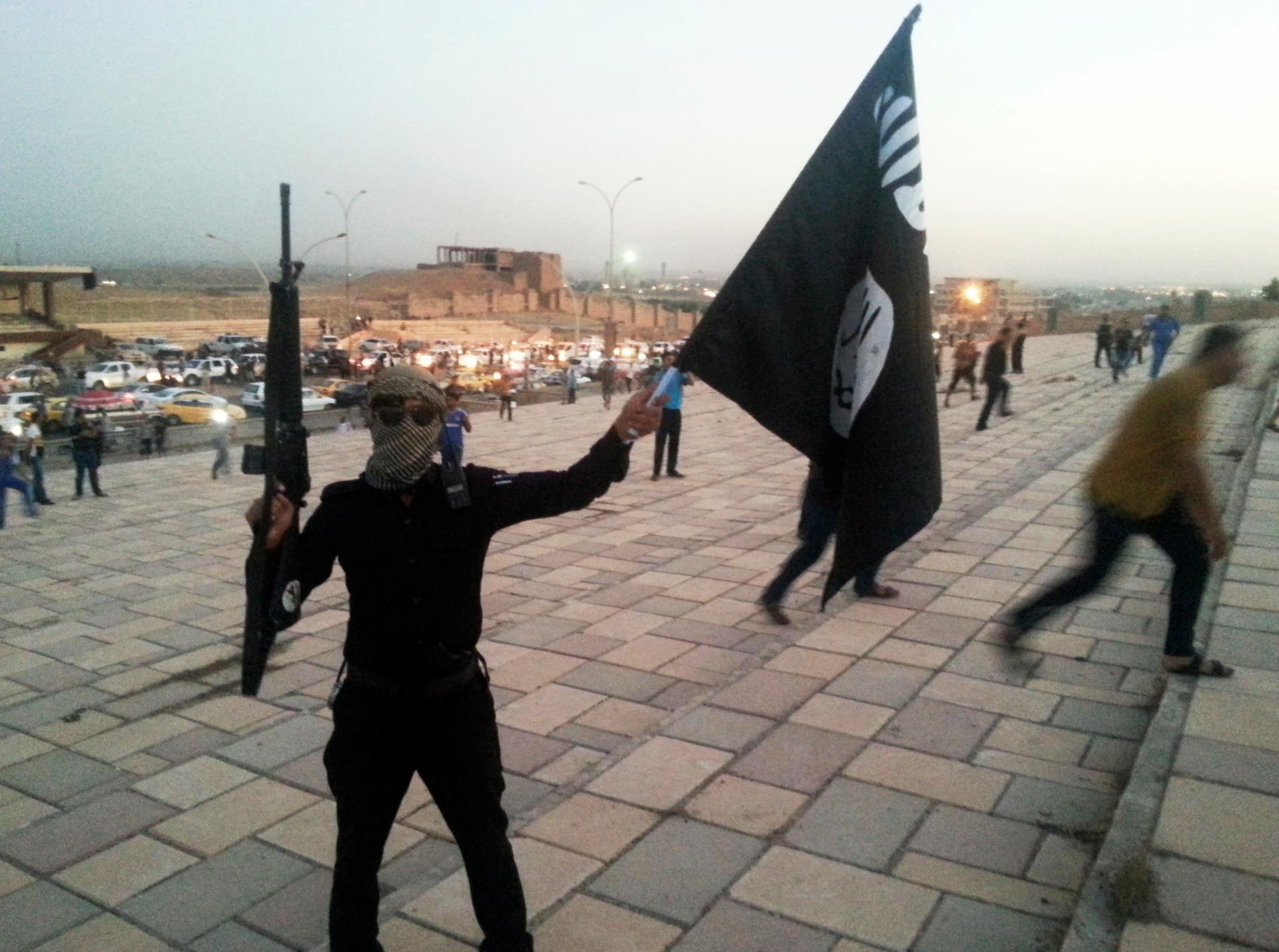How the US can take the fight to ISIS on the financial front
A fighter of the Islamic State of Iraq and Greater Syria holds an ISIS flag and a weapon on a street in the city of Mosul. Picture taken June 23rd, 2014.
“It’s one of the better funded groups that we know of,” says Matt Levitt, speaking of the Islamic militant group ISIS – the Islamic State in Iraq and Greater Syria.
Levitt directs the counter-terrorism program at the Washington Institute for Near East Policy. He also used to investigate terrorist finances for the FBI and the Treasury Department.
ISIS managed to loot several hundred million dollars in cash when they took Mosul in northern Iraq earlier this month. But they were making money well before that.
“In Iraq,” says Levitt, “unlike other places where al-Qaeda affiliates and al-Qaeda-core raised money through the abuse of charity and charitable donations, al-Qaeda-in-Iraq which later became the Islamic State of Iraq, which is now ISIS or ISIL (Islamic State in Iraq and the Levant), traditionally made money through corruption and criminal activity.”
Levitt says that the militants have done everything from oil smuggling – which they’ve been involved in since at least 2007 – to extortion, protection rackets, taxing minority communities, robberies, bank heists and kidnapping for ransom.
“They move their money out the door pretty quickly," he says. "They have a lot of expenses, especially salary payments, and payments to the families of people who are killed or in prison. When they move money, some goes through the formal banking system, and there’s some money moved through informal financial transfer mechanisms like hawala systems and of course cash couriers.”
Hawala, which means ‘trust,’ is an informal banking system where money doesn’t actually move at all.
"So if you wanted to send money from Boston to Pakistan, you find a hawala dealer in the Boston area; you give them $1,000 or whatever, plus a few dollars as their fee, and they’ll contact a hawala dealer that they know and trust and do business with in Pakistan," Levitt says.
Then your friend in Pakistan will come with the right code and they’ll get $1,000. It’s a very old and reliable way of sending money, Levitt says.
“It’s a little depressing having worked on this for a long time. To have seen the successes we had pushing back al-Qaeda-in-Iraq back in the day, to see them come back so strong now, militarily and financially," he says. "I think the mistake was that some people thought that because they were pushed back militarily, they were also crushed financially, which they clearly were not."
The financial resources were what the militants needed to regenerate.
“The good news is that we do have an understanding of how groups like ISIS are financed," Levitt says. "There are things we can do to not only push them back militarily, but to contain their financial resources. We can have to do these in tandem, and in ways we apparently didn’t really do very well over the past few years.”
“It’s one of the better funded groups that we know of,” says Matt Levitt, speaking of the Islamic militant group ISIS – the Islamic State in Iraq and Greater Syria.
Levitt directs the counter-terrorism program at the Washington Institute for Near East Policy. He also used to investigate terrorist finances for the FBI and the Treasury Department.
ISIS managed to loot several hundred million dollars in cash when they took Mosul in northern Iraq earlier this month. But they were making money well before that.
“In Iraq,” says Levitt, “unlike other places where al-Qaeda affiliates and al-Qaeda-core raised money through the abuse of charity and charitable donations, al-Qaeda-in-Iraq which later became the Islamic State of Iraq, which is now ISIS or ISIL (Islamic State in Iraq and the Levant), traditionally made money through corruption and criminal activity.”
Levitt says that the militants have done everything from oil smuggling – which they’ve been involved in since at least 2007 – to extortion, protection rackets, taxing minority communities, robberies, bank heists and kidnapping for ransom.
“They move their money out the door pretty quickly," he says. "They have a lot of expenses, especially salary payments, and payments to the families of people who are killed or in prison. When they move money, some goes through the formal banking system, and there’s some money moved through informal financial transfer mechanisms like hawala systems and of course cash couriers.”
Hawala, which means ‘trust,’ is an informal banking system where money doesn’t actually move at all.
"So if you wanted to send money from Boston to Pakistan, you find a hawala dealer in the Boston area; you give them $1,000 or whatever, plus a few dollars as their fee, and they’ll contact a hawala dealer that they know and trust and do business with in Pakistan," Levitt says.
Then your friend in Pakistan will come with the right code and they’ll get $1,000. It’s a very old and reliable way of sending money, Levitt says.
“It’s a little depressing having worked on this for a long time. To have seen the successes we had pushing back al-Qaeda-in-Iraq back in the day, to see them come back so strong now, militarily and financially," he says. "I think the mistake was that some people thought that because they were pushed back militarily, they were also crushed financially, which they clearly were not."
The financial resources were what the militants needed to regenerate.
“The good news is that we do have an understanding of how groups like ISIS are financed," Levitt says. "There are things we can do to not only push them back militarily, but to contain their financial resources. We can have to do these in tandem, and in ways we apparently didn’t really do very well over the past few years.”
